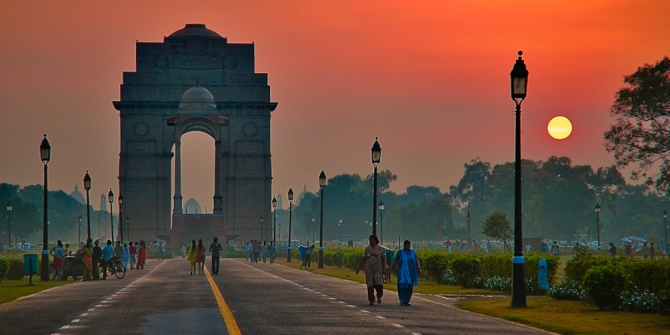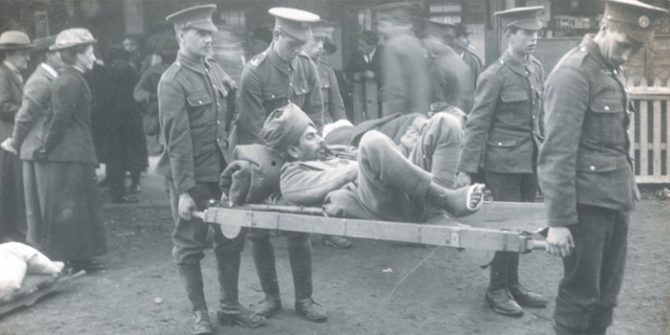 In January, Fayeeza Naqvi, Co-founder and Chairman of the Aman Foundation Pakistan, wrote on this blog about how the Aman Clinics Accelerator competition hoped to tackle the severe healthcare challenges facing Pakistan. Here she announces the winning team and how their venture will address the needs of underserved communities in Karachi.
In January, Fayeeza Naqvi, Co-founder and Chairman of the Aman Foundation Pakistan, wrote on this blog about how the Aman Clinics Accelerator competition hoped to tackle the severe healthcare challenges facing Pakistan. Here she announces the winning team and how their venture will address the needs of underserved communities in Karachi.
Karachi, my home, is a mega city with a population of 23 million. Orangi Town, a microcosm of Karachi, houses 3 million residents who earn an average of less than £100 a month. An inadequate public transport system in a sprawling metropolis, poverty and the resultant insecurity and violence deters healthcare providers from venturing here. Very few doctors want to work here on a regular basis. The relentless communicable diseases and the high maternal and child mortality rates make Orangi in dire need of social ventures that help its people.
Orangi is just one case in point that represents the stark economic disparity and inequitable distribution of primary healthcare facilities that is rampant in Karachi: 66% of the city’s population lives in underserved settlements similar to Orangi.
Pakistan’s healthcare crises persist, despite the sincere efforts of many. The challenges are real and formidable. As the world’s sixth most populous nation with a registered population of 180 million, Pakistan’s 5,600 primary healthcare facilities are unable to serve citizens satisfactorily, especially with the government spending just 1% of its GDP on healthcare. This absence creates a space for philanthropists to step in to advocate holistic and innovative solutions.
It is in this spirit that The Aman Foundation’s Aman Clinics Accelerator competition was born: as a social venture competition to source innovative and tech-focused ideas to provide primary healthcare in Pakistan. It was intended to source solutions for Pakistanis, by Pakistanis, keeping in mind the needs of vulnerable communities with challenges similar to Orangi.
The competition was a hit. 112 teams from around the world registered for the Aman Clinics Accelerator program. 50 of the submitted ideas were further shortlisted and, of these, 10 teams were assigned mentors to collaborate with on submitting business plans. 5 teams made it to the day-long finale, where they pitched their ideas before a tough panel of practitioners from across corporate and healthcare sectors. 1 winning team attained the grand prize of US$5,000 in cash and US$200,000 to seed fund their idea.
Team Alchemy comprised of MBA students from Karachi School of Business & Leadership (KSBL) and a doctor from Jinnah Postgraduate Medical Centre. What we at The Aman Foundation saw in them is not only the passion to help people but an innovative idea robust enough to scale. The core of their idea is simple: a venture that will evolve a healthcare eco system to engage and empower citizens through provision of last-mile healthcare in hard to reach communities.
Team Alchemy’s approach is based on a practical understanding of ground realities in severely underserved urban communities. With healthcare providers hesitant to work in volatile slums, the team decided to come up with a project where healthcare can instead be brought to them via technology.
There are three ways in the venture that will accomplish this:
- A Tele-Health program that will provide initial medical advice, guidance and referrals to those who call in
- Community Health Workers who will engage with local residents one-on-one to raise awareness on prevalent and contextual health issues
- An E-clinic will enable patients to video-conference with medical doctors, receiving consultations and prescriptions through this medium
This approach will enable a Resource Centre to be strategically located between many slums, with two doctors, two nurses, a small-pharmacy, and a diagnostic stat-lab. This resource centre will be designed to also cross-sell other goods and services, and evolve towards a hub with electricity and water to engage the community.
Aman’s commitment to providing healthcare, and its focus on usage of innovation and technology, is evident in our existing programs. For example, Aman Community Health Workers Program (ACHPW), and the SUKH Initiative for mother and child health, as well as Aman Tele-Health services, work on their own as well as facilitate and partner with other health initiatives. These ideas, grown one step at a time, have enabled us to take a leap of faith towards building innovative primary care facilities in peri-urban slums.
The Aman Foundation’s way forward includes plans to establish primary care facilities in Karachi by the end of 2016. We hope to leverage our partnerships – especially with the electronics company Philips – in this regard, to use technology and best practices in building these facilities. Impact and outcome will be evaluated based on the improvement in healthcare measures in the communities, such as child and maternal mortality, the rate of communicable diseases, and hygiene. We also hope to expand these clinics across the country, based on the outcome of the Karachi facilities.
The work that Aman Foundation does is based on my family’s simple beliefs. That the 30,000 mothers that Pakistan loses each year due to pregnancy and childbirth related causes deserve to live. The 200,000 new-borns that die each year in Pakistan deserve to live. The 32% of the children in Pakistan who are born underweight deserve to be born healthy. Communicable diseases can be avoided. Preventative measures can save precious lives. Pakistan’s underserved communities deserve to be served. Aman hopes to do just that, and with our new clinics venture, we are a step closer to getting there.
Cover image: Indus Hospital, Karachi. Credit: Indus Hospital/Andrew Reed Weller CC BY-NC-ND 2.0
Note: This article gives the views of the author, and not the position of the South Asia @ LSE blog, nor of the London School of Economics. Please read our comments policy before posting.
About the Author
 Fayeeza Naqvi is an LSE alumna and Co-founder and Chairman of the Aman Foundation, the largest private philanthropic trust in Pakistan founded by Fayeeza and her husband Arif Naqvi. Aman Foundation focuses on the key pillars of education and health and is dedicated to transforming lives by enhancing dignity and choice for the underserved. In 2015 Fayeeza accepted the prestigious BNP Paribas annual Grand Prix award for philanthropy. In 2016 she received the Global Humanitarian Award for Woman’s & Children’s Health, presented by the Bill & Melinda Gates Institute for Population & Reproductive Health at the John Hopkins Bloomberg School of Public Health. She also received the Power of Purpose award from Devex, an annual award presented in partnership with McKinsey & Company, honoring the top women leaders in global development. She serves as trustee of the British Asian Trust and is also the founding partner of LSE’s South Asia Centre Board.
Fayeeza Naqvi is an LSE alumna and Co-founder and Chairman of the Aman Foundation, the largest private philanthropic trust in Pakistan founded by Fayeeza and her husband Arif Naqvi. Aman Foundation focuses on the key pillars of education and health and is dedicated to transforming lives by enhancing dignity and choice for the underserved. In 2015 Fayeeza accepted the prestigious BNP Paribas annual Grand Prix award for philanthropy. In 2016 she received the Global Humanitarian Award for Woman’s & Children’s Health, presented by the Bill & Melinda Gates Institute for Population & Reproductive Health at the John Hopkins Bloomberg School of Public Health. She also received the Power of Purpose award from Devex, an annual award presented in partnership with McKinsey & Company, honoring the top women leaders in global development. She serves as trustee of the British Asian Trust and is also the founding partner of LSE’s South Asia Centre Board.







